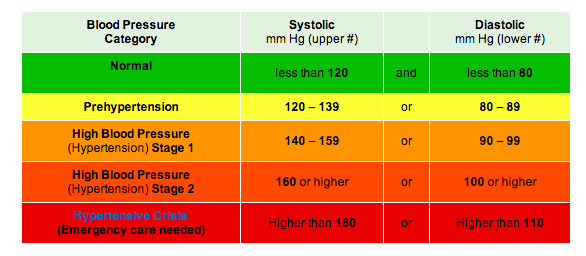About one in three Americans has high blood pressure, and typically it’s thought that getting that blood pressure number down as low as possible is the goal. However, a new study published in the journal JAMA Internal Medicine didn’t find that to be true.
The researchers looked at data from 4,480 participants in a 21-year long study that followed them to see if they developed any sort of heart illness. The researchers specifically looked at the participants’ systolic blood pressure (SBP)—the top number in a standard blood pressure reading.
In the study, elevated SBP was classified as 140 or greater, standard was 120-139, and low was less than 120. The researchers found that among people with high blood pressure, lowering their blood pressure to below 120 provided no additional benefit for reducing heart attack, heart failure and stroke risk. Getting blood pressure levels below 140 helped, but lower than 120 didn’t.
“As a clinician there is a notion suggesting that lower blood pressure is better but our current research to date is controversial and not conclusive,” says lead study author Dr. Carlos J. Rodriguez, an associate professor of public health sciences at Wake Forest Baptist Medical Center. “We found that hypertensives with a blood pressure between 120-138mmhg have the greatest benefit and those with a blood pressure less than 120mmhg did not have additional benefit.”
The study goes against conventional blood pressure wisdom. The American Heart Associations’ numbers are a little different, and show that the objective is to get below 120.
Here are the blood pressure categories defined by American Heart Association:

“Our study does emphasize that the greatest clinical benefit comes from getting patients below 140mmhg. This was not a treatment study so I do not think it changes treatment but it does bring into question the notion of whether lower blood pressure is better,” says Rodriguez.
There’s a lot of research on the benefits of lowering blood pressure, and there would need to be many more studies, including clinical trials to confirm whether these new findings are true. For now, it’s just preliminary.
More Must-Reads From TIME
- The 100 Most Influential People of 2024
- How Far Trump Would Go
- Scenes From Pro-Palestinian Encampments Across U.S. Universities
- Saving Seconds Is Better Than Hours
- Why Your Breakfast Should Start with a Vegetable
- 6 Compliments That Land Every Time
- Welcome to the Golden Age of Ryan Gosling
- Want Weekly Recs on What to Watch, Read, and More? Sign Up for Worth Your Time
Contact us at letters@time.com